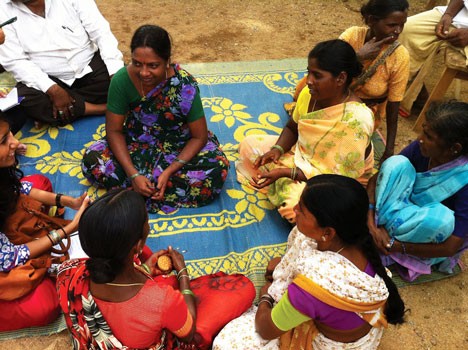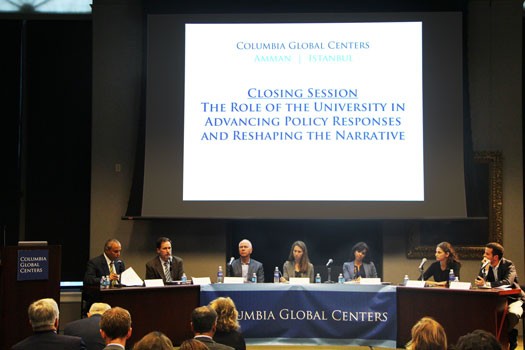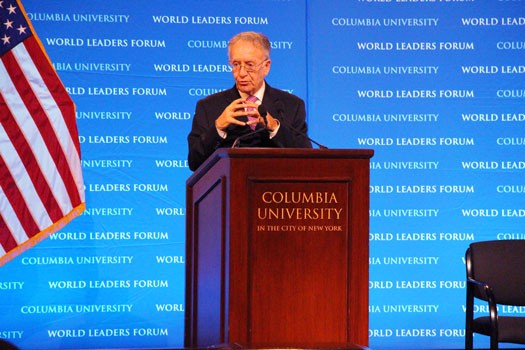Why

In the Core Curriculum, Columbia’s undergraduates read Plato’s Republic to ask: What is justice? Across our campuses, we not only ask but act together to answer and address what keeps us from living up to our ideals as a society.
While recent decades have seen progress in some areas, marriage equality in the US for one, injustice persists in stark forms. The prosperity and comfort of some highlight the need and uprootedness of others, and, in spite of the interconnections of our age, the gap between haves and have-nots is more pronounced than ever. Invisible strings of access and censorship restrict open debate and the flow of people and ideas.
How are people’s chances diminished because of their race, gender, religion, or background? Whose voices are heard? How are resources shared? What steps can be taken to expand the public good? These are issues that concern us all, around the world, as people bound to one another.
Our commitment to Just Societies renews and emboldens efforts to build an equitable, inclusive world through research, teaching, and civic engagement.
The Challenge

We have only begun to understand the dynamics of contemporary privilege and inequality. Poverty is one glaring example. In the US, the top 0.1 percent of the population earns on average roughly 184 times more than the bottom 90 percent. Globally, the gap is starker: cumulatively, some 85 of the wealthiest people are worth more than the poorest 3.5 billion people. How do we make sure all people have enough food to eat and water to drink? How can each person thrive on her own terms and regardless of circumstance?
At Columbia, we must bring our most advanced thinking and most sophisticated methods to bear on achieving greater justice. As we do, we learn from and with the world, avoiding the arrogance of the outside expert by working with partners who understand injustice—and what can remedy it—firsthand.
The Columbia Commitment

Justice begins right on campus—with the diverse community we create, the values we embody, and the ideas we explore.
We commit to strong financial aid for students at every school to make sure that our classrooms—and eventually the nation’s courtrooms, newsrooms, and boardrooms—benefit from the very best talent from all backgrounds, chosen for their ability, not their ability to pay tuition. And together, we tackle complex issues from disability rights to the dynamics of sexual violence, gender, and race, including through our office of University Life, established in 2015.
Recent transformative initiatives include a ten-year Atlantic Philanthropies partnership supporting activists and scholars aimed at ending anti-black racism. Social justice appears as a focus for faculty and students across our schools and campuses, from veterans in our School of General Studies to environmental justice through the Earth Institute. It spans programs throughout our law school and specific institutes, from the Center for Justice, which sponsors programs related to incarceration, to the new Knight First Amendment Institute to the anticipated Eric H. Holder Initiative for Civil and Political Rights.
In 2017, to amplify such efforts, we have convened a University-wide faculty group addressing social justice. As never before, we are working together to harness resources that shape thinking, models, and practical solutions for a fairer world.
Learn more about our commitment to Just Societies
Learn about our other Columbia Commitments
Make a gift to support the Columbia Global Centers
Related News from the Global Centers
On March 8, Reid Hall members, students, and faculty celebrated International Women's Day with a fundraiser for Le Filon, a local association that provides shelter and support for homeless women in Paris.
The Institute for Religion, Culture & Public Life and Columbia Global Centers are organizing a conference entitled "Pluralism(s) in Emergencies: Movement, Space, and Religious Difference" in Tunis, Tunisia on July 11-12, 2018. The project is being organized with support from the Department of Culture Studies and Oriental Languages (IKOS) at the University of Oslo; and the Centre for Religion, Conflict, and Globalization at the University of Groningen.
In her new book, Brazil: A Reconstruction, journalist Maria Paula Carvalho (JRN '13) shares insights on the current state of political and economic affairs in her home country.
This project remains ongoing and aims to address the adverse effects of armed conflict on the mental health of individuals, families and communities in Yemen, to bring mental health concerns into Yemen’s peace and reconciliation processes, and to strengthen recognition of the human right to mental health in Yemen and internationally.
What role does religion—and particularly Islam—play in naming, framing, and governing violence against women (VAW) and gender-based violence (GBV)?